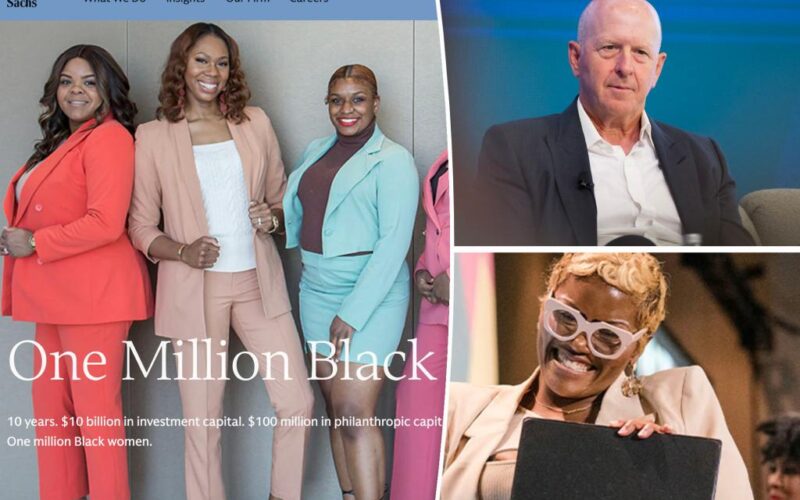Goldman Sachs has scrubbed mentions of “Black” and other references to race from its official website touting a diversity initiative amid an industrywide rollback of so-called DEI programs and increasing scrutiny from the Trump administration, according to a report.
In 2021, the Wall Street giant launched the “One Million Black Women” program in which it pledged $10 billion in investments and $100 million in philanthropy specifically aimed at supporting black women.
Goldman in recent weeks has revised promotional language for its “One Million Black Women” initiative, removing explicit references to race and reframing the program in more generic economic terms, the Wall Street Journal reported.
A comparison of old and new text shows that phrases like “for one million Black women by 2030” and “Black women’s lives” were deleted, while broader terms such as “growth and opportunity” were added.
The bank also replaced repeated mentions of “One Million Black Women” with “Goldman Sachs” in several places, shifting the emphasis from a demographic focus to the institution itself.
Another diversity-based Goldman initiative called “Black in Business,” which was originally designed explicitly for black businesswomen, has also had racial references removed.
The program’s description now simply states it helps entrepreneurs “stay in the black,” referring generally to maintaining profitability.
Additionally, updated figures show an increase in financial commitments, with investment capital rising from “nearly $3 billion” to “$3.6 billion,” and philanthropic support increasing from “$39.4 million” to “$41 million.”
The changes appear aimed at preserving the program’s economic goals while minimizing legal risks associated with race-specific language.
Goldman instituted changes to the program two years ago by opening it up to all solo entrepreneurs — though the bank quietly removed explicit references to race from the program’s homepage in recent weeks. The name of the program itself remains unchanged.
Earlier this year, The Post reported that Goldman planned to scale back its DEI, or diversity, equity and inclusion policies in response to pressure from the Trump administration and the threat of lawsuits, joining other Wall Street firms like BlackRock and Bank of America in removing DEI language from official filings.
The recent revisions reflect wider corporate anxieties about potential legal repercussions surrounding diversity, equity and inclusion (DEI) programs, especially since a Supreme Court ruling in 2023 declared race-based affirmative action in college admissions unconstitutional.
In 2023, the Supreme Court ruled that race-conscious admissions policies at Harvard and the University of North Carolina violated the Equal Protection Clause, effectively ending affirmative action in college admissions.
This landmark decision prompted Goldman and other corporations to reconsider the structure of their diversity programs to avoid legal challenges and criticism from the Trump administration.
Investments related to the program are now primarily managed through Goldman’s Urban Investment Group, helping the bank comply with federal mandates aimed at supporting low-income areas.
Initially, Goldman had planned for other internal teams to actively invest in projects specifically benefiting black women.
“One Million Black Women is one component of our longstanding commitment and broader strategy focused on advancing small businesses, job creation, and economic growth in rural and urban communities across America,” Asahi Pompey, Goldman’s global head of corporate engagement, told The Post.
“We regularly evaluate our programs to ensure they are impactful, align with the firm’s strategy, and are compliant with the law.”
Several major Wall Street firms have scaled back or modified their DEI initiatives in recent years.
In February, Goldman ended its requirement for companies going public to have diverse board representation, citing legal developments.
BlackRock recently did away with workforce representation goals and no longer mandates diverse candidate slates for interviews, while also merging its DEI team.
Bank of America has removed “diversity and inclusion” from its latest annual report, opting for terms like “opportunity and inclusion.”
Similarly, JPMorgan Chase has reduced its mentions of DEI, and CEO Jamie Dimon suggested some efforts might have been “excessive.”
Citigroup’s CEO announced the end of mandatory diverse applicant pools for new hires and State Street has dropped its specific board diversity targets in its proxy voting guidelines.








